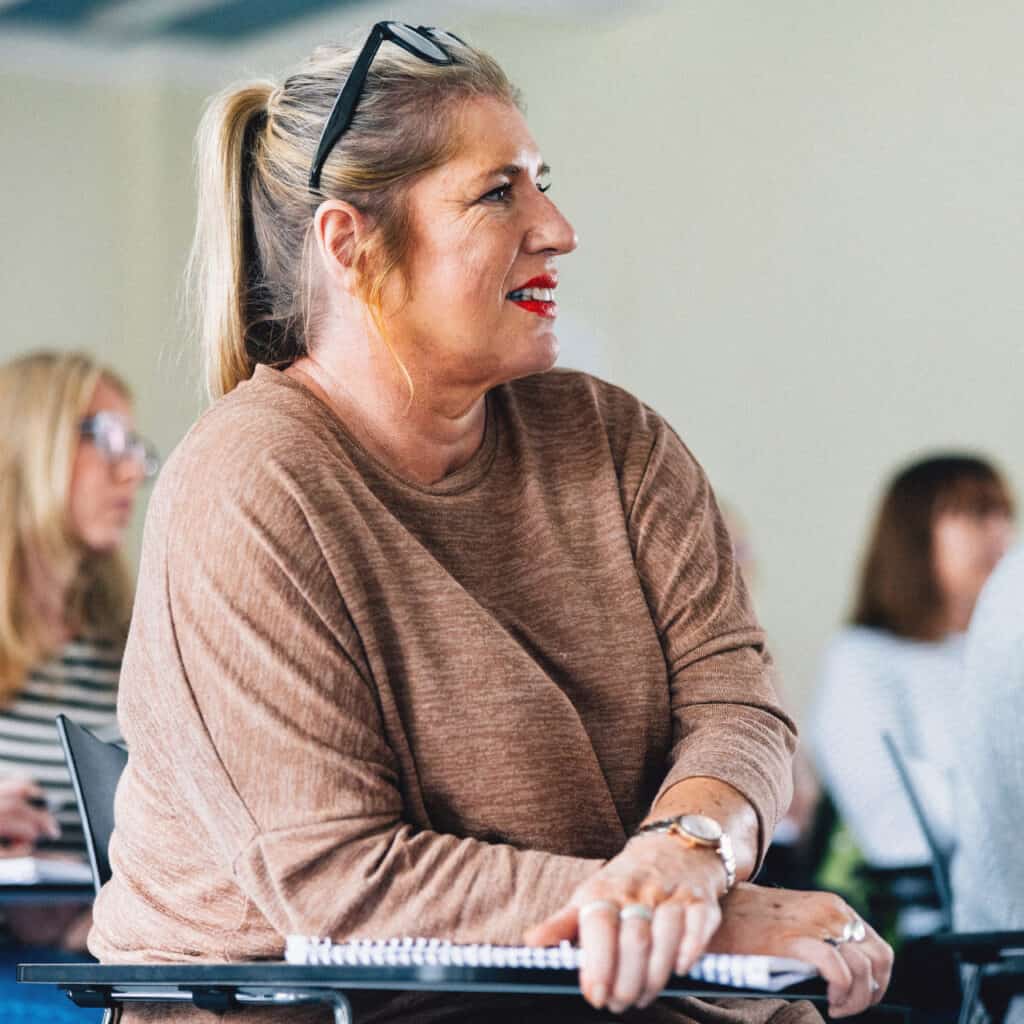1st
in Counselling for teaching on my course
National Student Survey 2024
4th
in the UK for overall average positivity for Counselling
National Student Survey 2024
100%
positivity that the course has developed your knowledge for the future
National Student Survey 2024
Join us at one of our Open Days!
Saturday 11 October
Sunday 26 October
Saturday 22 November
Saturday 11 October
Sunday 26 October
Saturday 22 November
Our next Open Day is in:
Overview
Counselling is rapidly growing as a profession and is increasingly valued in education, medicine, the caring field and most workplaces.
If you’re looking to become a professional counsellor, our Certificate in Counselling is the ideal first step to start your training.
With this Level 4 course, you’ll begin to develop your counselling skills and understanding. After completing this programme we offer the next stage in counselling training: BA (Hons) Humanistic Counselling. During this BA (Hons) degree you will become a fully qualified counsellor after completing all practical and academic requirements of the second year.
Who is this qualification for?
This course is ideal if you:
- Want to begin your training as a professional counsellor.
- Want to change your current career to become a counsellor.
- Wish to understand and adopt counselling skills to your current role.
- Or would simply like to improve personal and professional relationships.
The Course
What you will study
You will study a range of topics during the course. The topics you will study could include:
Indicative Course Content Phase 1:
- Philosophy of Humanistic Practice
- Carl Rogers Core Conditions
- Acceptance
- Empathy
- Genuineness
- Presence
- Effective Listening
- Non-verbal and Para-verbal Communication
- Giving and Receiving Constructive Feedback
- Introduction to Transactional Analysis
- Introduction to Transference
- Loss and Change
- Perceptions and Attitudes towards Diverse Cultural Forms.
Indicative Course Content Phase 2:
- Exercises to Continue Self Awareness
- Resistance and Reluctance
- Immediacy
- Defences
- Challenges (Self and Others)
- Johari Window
- Appreciation of Difference
- Hierarchy of Human Need
- Group Process and Dynamics
- Practice in Small Groups
- Peer Assessment of Taped Interaction
- Core Conditions of Humanistic Practice Accentuated
- Transactional Analysis
- Transference
- Feedback.
Teaching and Assessment
How you will learn
The Certificate in Counselling Skills is a free-standing course that has two modules, Phase 1 and Phase 2. There’s a total of 20 sessions (10 in each phase) with two entry points for Phase 1 (September and February) and Phase 2 (February and April).
Both phases combine humanistic theory, values and ethical practice to counselling skills used in one-to-one, face-to-face situations and wider social contexts at work as well as in the community.
The sessions at the University are delivered on weekday evenings and Saturdays to give you flexibility around your current commitments.
Facilities
Use University resources, equipment and study spaces
Use facilities including the Brain Imaging Unit, VR Immersive Suite, Psychological Test Centre, Interview and Observation Suite and individual fully equipped testing cubicles and use industry standard equipment and software throughout your studies.
Learning Resource Centre
The Learning Resource Centre (LRC) contains the library, a café, IT/teaching rooms and the Support and Information Zone (SIZ).
Library
Our campus library holds more than 200,000 books and over 500,000 eBooks.
Careers
Where you could go after your studies
You can apply for progression onto the BA (Hons) Humanistic Counselling once you complete this Certificate.
Students with additional qualifications/credit can progress from Certificate level to degree level in five years. The BA (Hons) in Humanistic Counselling is also an excellent development for students already holding a Diploma in Counselling.
As a student in the department, you will also have access to a range of opportunities, including:
- Study abroad
- Erasmus
- Internships
- Placements
- Voluntary research assistance
Student
Course Costs
Course Fees 2025/26
UK fee
Please note, this course consists of two modules.
Part time fees are calculated based on sum of module credits taken per annum.
For further details about fees, please see our Tuition Fee page.
For further details about international scholarships, please see our Scholarships page.
To find out about any additional costs on this course, please see our Additional Costs page.
Course Dates
Please see our Certificate in Counselling Skills Course Dates (Word) for a full list of teaching dates across 2025/26 and further information on teaching locations.
Entry Requirements
This course is open entry for students by application and reference.
Apply
Please note that when applying you will need to complete the full online application form, which includes a supporting personal statement and a reference.
September 2025 entry
To apply for the September 2025 entry route for this course, please click the button below.



